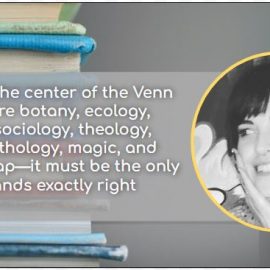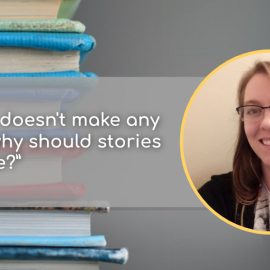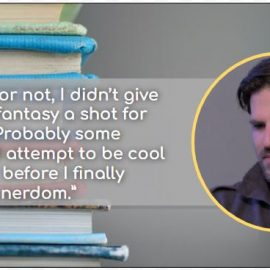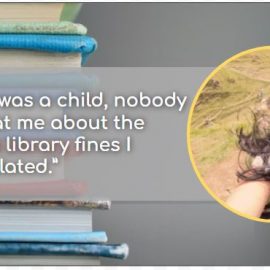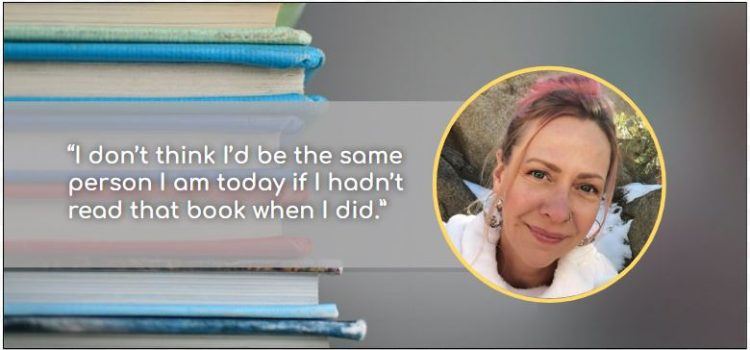
What book literally changed the course of Kristi’s life? Why did she take a several-year hiatus from reading altogether?
Kristi is a Shortform guide writer with truly eclectic taste. She loves magical realism and wishes she could share her love of Richard Brautigan with more people.
Our Interview With Kristi
Kristi thrives on fiction that’s set in a different world or doesn’t involve modern technology. Here’s our interview with her.
What’s your favorite book and why?
In Watermelon Sugar by Richard Brautigan—this predates the Harry Styles song by 50 years—ha! I have the first line of the book tattooed on my arm. It makes no sense out of context, and only questionably makes sense in context, which is what I love about Brautigan’s writing. It’s surrealistic and strange, and there’s a delightful and disorienting play between light and dark. I’ve read this little book about five or six times, and it feels like wandering back into a dream I had one afternoon long ago.
Each time I go back to this dreamland called iDEATH, I notice details I’d never noticed before. I sense another layer of symbolic meaning hidden behind the rivers and the tigers and the glass tombs and the forgotten works. And, of course, the watermelon sugar—the gentle sweetness. How much of my interpretation of buried symbolism was intended by Brautigan, I’ll never know. But I know that, on some plane of existence, I live there in that world.
What’s on your reading list these days?
On a recent road trip, I listened to the book Sand Talk: How Indigenous Thinking Can Save the World by Tyson Yunkaporta, and—wow—it’s fantastic! If y’all think Braiding Sweetgrass is good, you must check this book out! I actually highly recommend the audio version because the book is centered around oral storytelling traditions, so I think listening to him speak it adds a dimension you wouldn’t get from reading it.
As far as what’s next … well, the list is longer than my life will be. But, next up on Audible for the next road trip is The Mist-Filled Path: Celtic Wisdom for Exiles, Wanderers, and Seekers by Frank MacEowen.
If you could have a dinner party with any three authors—dead or alive—who would they be and why?
Richard Brautigan, Tom Robbins, and Herman Hesse. The conversation would be wild and weird and hilarious and enlightening. Hanging out with those three would be like a psychedelic experience without the need for any substances!
What’s your favorite genre? Why does it intrigue you?
Magical realism/fantasy. I guess that’s the genre both Brautigan and Robbins would fall into. I like stories that take me to a world that’s unlike the one I have to live in every day. But it’s the writing style that draws me in more than the story itself. Tom Robbins is a master of metaphor and description. Sometimes, the way he describes things makes me laugh out loud—or pause to just marvel at his imagination.
Are there any book genres or tropes that you dislike or refuse to read?
I really don’t read any kind of fiction unless it’s something set in a different world—but also not futuristic sci-fi. It should be a fantasy world where modern technology doesn’t exist—or set far in the past where modern technology doesn’t exist yet. I’m the same with TV. I belong to a different era, and I use books and TV to escape there.
What’s your favorite way to read a book?
Physical books, always. Unless I’m driving; then I’ll listen to non-fiction books on Audible.
What book do you think everyone should read in their lifetime?
I don’t know if there’s a one-size-fits-all, but I do think the world would be a better place if everyone would absorb some of the material in the works of the early psychedelic pioneers like Aldous Huxley, Timothy Leary, and Terence McKenna.
Who are your favorite authors?
The same three I’d have the dinner party with—Richard Brautigan, Tom Robbins, and Herman Hesse! Because their writing transports me to another place and time where I forget the real world even exists, and their storylines and characters are only vehicles for philosophical musings about life.
How have your reading tastes changed over the years?
The only change was when I left grad school after five years and took a several-year hiatus from reading entirely. I was so sick of reading I couldn’t even look at a book. Thankfully, that has passed, and I can thoroughly enjoy reading again. But I’ve always read escapist fantasy books.
Was there a specific book that sparked your love of reading? How so?
I’d have to say A Wrinkle in Time. It’s pretty much the teen version of the kind of magical realism I still love reading! I’ll also give a nod to The Once and Future King, which sparked my whole adolescent phase of reading anything with knights and dragons and wizards and such.
Do you have any guilty pleasure books?
I never feel guilty about books!
What’s an interesting fact that you learned from a book recently?
The Immortality Key was my favorite book I’ve written a guide for so far. I learned so much, but the premise of the book is that Christianity began as a female-led mystical cult that used psychedelics to induce transcendental states to connect with the divine. That hypothesis—and all the evidence the author gives to support it—just blew my mind.
Have any books you’ve read caused you to make any life changes or to develop any habits?
The book Be Here Now by Ram Dass has been the most influential in my life. I read it in my early 20s, and it quite literally took me on a whole new life path. I don’t think I’d even be the same person I am today if I hadn’t read that book when I did.
What’s your favorite quote from a book or an author?
Picking one favorite quote is impossible, but here’s one I like: “I’ve sucked way too much cement for this year. Bad juju rising off them city sidewalks. I need to babble with a brook or two, inhale starlight, make friends with some trees.” (Tom Robbins, Fierce Invalids Home From Hot Climates)
What are your favorite book adaptations?
These may seem a little out of left field, but, Little House on the Prairie and Anne of Green Gables. The books were favorites of mine as a kid, and I adore the TV shows.
Are there any lesser-known books that you’ve read that you want others to know exist?
Few people know Richard Brautigan’s work. And, even when I’ve gotten some friends to read it, they usually respond with “I didn’t get it.” I often wish I would meet more people who feel the way I do about his work. What makes it stand out is his writing style, which is utterly unique. I’m always looking for “similar” authors—but there really are none. Tom Robbins is probably the closest. “He created his own Kool-Aid reality and was able to illuminate himself by it.” (Richard Brautigan, Trout Fishing in America)
At Shortform, how do you go about working on a book that has viewpoints you don’t agree with?
Oh, boy, did I have to grapple with that with The Art of Seduction! Some areas of it were downright disturbing. I just tried to remind myself that my job was simply to present the author’s viewpoint as neutrally as possible, and I relied a lot on my editor to give me feedback about how my tone was coming across. It was a team effort, and, in the end, we actually had a lot of laughs throughout the process!
Are there any books you had to read for Shortform that you thought you wouldn’t like and ended up loving?
No, but I did work on one business book, The Minimalist Entrepreneur, which I initially was not thrilled about and then ended up thinking was informative and useful. Y’know, in case I ever want to start a business, I now kind of know how.
What are your favorite books in the Shortform library and why?
The Immortality Key was one of the most fascinating books I’ve ever read in my life. And, although it was enormously challenging, I loved getting to work on the guide for it! I’m still mind-blown by that book.
Other favorites in the library include The God Delusion by Richard Dawkins, Joseph Campbell’s Hero With a Thousand Faces, and The Demon-Haunted World by Carl Sagan.
Kristi’s Recommended Reading List
- In Watermelon Sugar by Richard Brautigan
- Sand Talk: How Indigenous Thinking Can Save the World by Tyson Yunkaporta
- Be Here Now by Ram Dass
- The Immortality Key by Brian C. Muraresku
About the Series
At Shortform, we want to give our employees names and faces so you can get to know the people who make the magic happen. That’s why we’re doing the Shortform Reads series, where we interview our employees and share their thoughts and opinions. You can check out more employee interviews here.



